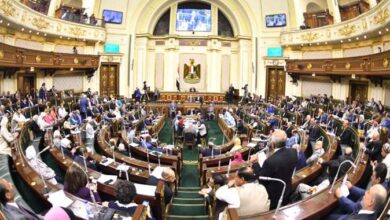Workers of the Amonsito textile factory entered the tenth day of their sit-in outside the gates of the Shura Council, Egypt’s consultative chamber of parliament.
Drivers stuck in traffic turned to listen, passers-by stopped to watch and tourists snapped pictures as workers chanted about government repression. "They care about football but not about the workers,” they yelled.
“The government likes to keep the people entertained and to keep us away from politics,” one protester remarked.
While workers may have succeeded in attracting attention, Ashraf Sayed, an engineer from an Amonsito factory, told Al-Masry Al-Youm that the government had yet to respond to their protest.
“Our union leaders have gone to ministers, state security and other government offices around the country, but no one will listen to us," said worker Mossad Abdel Rassoul. "So we are protesting here until they do.”
In 1979, Syrian-American business tycoon Adel Agha established Amonsito. In 1989, he centralized his many factories in the 10th of Ramadan Industrial Zone, forming the Amonsito complex that today is at a standstill. In 2003, Agha was sentenced to three years in prison for import violations. Workers, however, are uncertain as to whether he actually served his sentence or merely left the country after coming to an agreement with the government.
In 2007, Agha fled the country after authorities raised further charges against him, leaving the debt-laden Amonsito factory behind. Workers managed to self-administer the factory for one year, after which utility bills became too burdensome. Government representatives eventually closed the factory and paid the workers 13 months of salaries with the condition that they remain at home.
Though the factory complex once boasted a 5000-strong work force, Agha had reduced these to just over 1500 by the late 1990s. The vast majority of workers had spent up of 20 years at the plant. With a few exceptions, none of these workers will seek new jobs until they receive their rights from Agha and the government.
In 2008, monthly paychecks suddenly stopped and workers began a wave of protests. Each new protest ended with the payment of emergency compensation, which ranged from LE300 to LE700.
“This is an insult,” Abdel Rassoul exclaimed. “I can’t feed my family on LE300 a month.” Another engineer at the protest, who has also remained unemployed since the standstill, asserted that protesters would not leave until the factory had been re-instated or all the workers had been properly reimbursed according to the law.
“The law is not applied here,” explained Amonsito engineer Ashraf Sayed. “They don’t want to solve this problem.” With more urgent matters–like the president’s health and other strikes–to worry about, the engineer believes their grievances are simply being ignored.
At noon Monday, the worker’s first union member, along with an accountant, were asked into the parliament building to begin negotiating a solution. One day later, union members finally met with Parliament Speaker Fathi Sorour, who promised to look into the matter. On Wednesday, a committee from Bank Misr, a group of investors and Investment Ministry officials visited the Amonsito compound to assess the chances of re-starting the factory.
Labor Minister Aisha Abdel Hadi, meanwhile, said she had offered workers alternative employment at the Suez Trust Company, claiming that protesters were not interested in new jobs. But according to a press statement issued by Amonsito’s union, a mere 15 Suez Company jobs had been available for a workforce of 1200.
Sharing the sidewalk with Amonsito employees are over one hundred workers from the Salemco factory, another textiles producer in the 10th of Ramadan Industrial Zone. For three years running, Syrian-Egyptian owner Mohamed Abdel Halim has shut down the factory for months at a time, in what the workers say is an effort to encourage them to leave.
The strategy seems to be working. Of the original 600 workers, only 250 are now left. But protesters, who just finished their fifth night on concrete, think otherwise. On Wednesday morning, they shouted to both passers-by and the absent government: "You sleep on silk, we sleep on concrete” and “Here we’ll stay til Judgment Day.”
A couple hundreds of meters away, about 40 people with disabilities, also chanting, filled the streets surrounding the parliament buildings.
Leading the group is Mahrousa Salim, a feisty woman in a wheelchair. After being assaulted by a policeman, human rights groups interceded on her behalf and Mahrousa was granted one of her group’s demands: namely, an apartment. Other protesters demanded government support in finding employment. This, Salim claimed, is their right of every disabled person under Egyptian law.
Rather than staying in her new home, Mahrousa is now in her 16th day of protesting on behalf of her disabled friends for what she was already granted. On Tuesday, they began a hunger strike. The next day, Mahrousa became the first to require hospitalization. But by early afternoon, she was back on the street leading anti-government chants.
Mahrousa claims that, upon seeing her at the protest Monday, MP Hassan el-Tunisi threatened her with the loss of her new apartment. The previous day, a man on a motorcycle called Ahmed–purportedly sent by State Security officials–had tried to bribe Mahrousa into abandoning her fellow demonstrators. But she held her ground. One of her fellow protesters described the attempted bribe as being part of a wider government strategy of “dividing and conquering” all opposition.
On Sunday, government officials promised some of the protesters that they would soon be granted their demands. Upon going to a government facility, however, disabled protesters say they were then locked up. Mahrousa said she was receiving phone calls from her colleagues that were being held and abused by police.
Saeed Abdel Aziz stood to the side of the main body of protesters clustered around the parliament building. His daughter, Tahani, was born mentally disabled. A widower, the father of four is now trying to provide for his family as a government-employed electrician. Especially taxing are the medical costs for Tahani, however, who requires special attention.
Abdel Aziz echoed the calls of the Amonsito workers, saying, “Where should I go? What should I do?”
In a related development, the Egyptian labor movement was granted the US-based Keany-Kirkland Award on Saturday.
“They are leading the most significant social movement in the Arab world since World War II and the largest labor unrest in Egypt since the late 19th century," said award officials. "Egyptian workers are continuing to challenge their employers, their unions and their nation’s government.”
A recent report by the AFL-CIO Solidarity Center, entitled “The Struggle For Worker Rights in Egypt,” highlights the interconnected nature of Egyptian strikes and the global economic crisis, and how Egyptian labor movements were playing an important role in realizing workers’ rights.
A Wednesday press release issued by Amonsito’s union press release concluded by saying that protestors had no plans to leave before their demands were met. “Long live the struggle of Amonsito workers, long live the struggle of Egyptian workers.”
“What gives me hope are my rights," said one of the workers. "And I won’t leave until I get them.”



